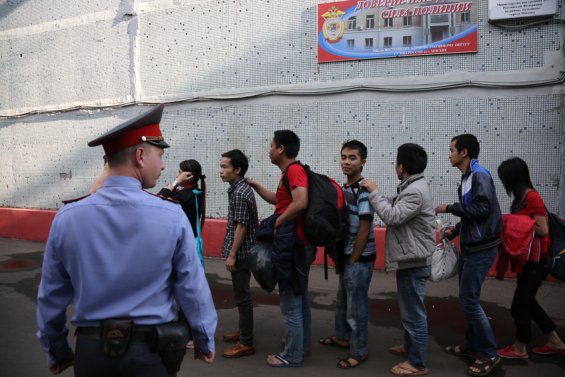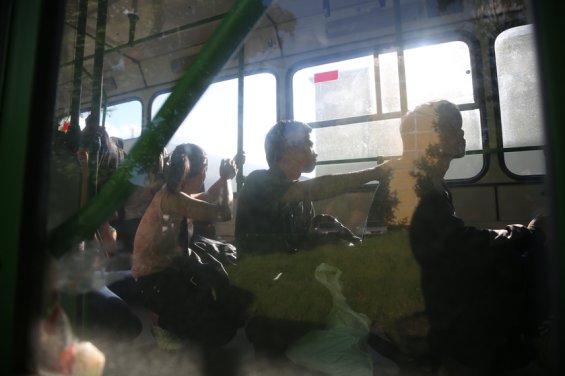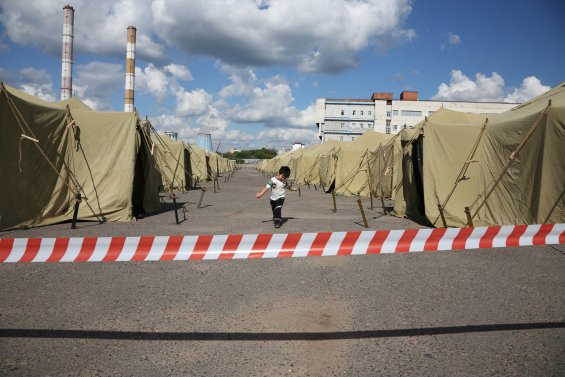In recent weeks, widespread immigration raids have been reported, and that pace has quickened further in recent days. This is the story of one of the immigration camps where those detained in raids are taken.
Update: A criminal case has been opened against the “employers” of these migrants. See our separate translation. – Ed.
Massive raids continue against migrants in Moscow. The Main Directorate of the Interior Ministry denies that this is a reaction to the beating of a policeman by Dagestanis at Matveyevsky Market. They say the operation was planned long ago.
The raids are conducted on the basis of criminal cases opened up on evidence of organization of a criminal gang (Art. 210, part 2 of the Russian Criminal Code) and organization of illegal migration (Art. 322.1, part 2 of the Russian Criminal Code). The targets of the raids have been construction sites and underground sweatshops, one of which was located at the former Cherkizov Market (Izmailovo) and the other at 2nd Irtyshsky Passage, in the industrial district of Golyanovo. About 1,200 Vietnamese were detained at Irtyshsky Passage alone. Near their former “workplace,” a tent city has been put up and migrants are being taken there since there was no room for them in the special settlements of the Interior Ministry. Here they await deportation back to their homeland.
Not even the marshrutki [minibuses] go to 2nd Irtyshsky Passage. The Uzbek driver says, “You’re calling it something pretty – a camp! We call it ‘special settlement’. It’s not a prison, but it’s no better.”
The deportation camp for migrants is located behind a six-meter fence made of concrete slabs and metal plates. The massive gates are tugged open by hand by OMON [riot police] guards, and on a Saturday morning, police cars are coming and going.
The camp “opened” on 1 August – and for three days “tours” have been organized for journalists. On the first day, they showed them only facades – tents put up right on the pavement. The spectacle began later.
On Saturday, journalists from the federal TV channels crowded outside the camp gates: “It’s humiliating, of course, they’re in a cage, and we have to film them,” a middle-aged cameraman said. But when a van pulled up to the gates, everyone lunged to snap pictures of the frightened faces of the Vietnamese women in the windows.
Anton Tsvetkov, deputy chairman of the public council of the Main Directorate of the Russian Interior Ministry for Moscow accompanied the tour for Aleksandr Brod and Vladimir Osechkin, members of the Public Chamber and creators of Gulagu.net. On the previous days, human rights advocates Vladimir Lukin [the Russian ombudsman for human rights], Svetlana Gannushkina and Andrei Babushkin [experts on migrants’ and prisoners’ rights, respectively] visited the camp, calling the conditions unsanitary, and emphasizing that such a camp “has no legal status.”
According to official information, by the time we arrived there were about 200 “permanent residents” of the camp, although the entire two hours that we examined it, two vans and 9 minibuses, packed with Vietnamese people, stood parked nearby with closed doors. They were not allowed to come out in the presence of the observers.
The tents were pitched on the grounds of the former marketplace. They were placed close together, and there were 20 of them, made with heavy fabric (produced by the Nizhegorodsky Region Factory of the All-Russian Society for Disabled.) Inside one tent, there were 20 double bunk beds (in some there were only single bunk beds). On the outside, clothing and underwear was hanging on lines to dry.
“Let’s go through the whole camp centrally so that you can film the entire picture,” Anton Tsvetkov told journalists. “This is our field kitchen, you can try the buckwheat kasha. Embassy representatives complain that Vietnamese don’t eat it. Of course, a more understandable food for them is rice. But see, all the plates are clean,” he said, pointing to a garbage can with paper plates.
The journalists follow the speakers, and I remain behind to speak with the migrants. It turns out that beside the Vietnamese (and they really are in the majority here) there are four Tajiks in the camp who were seized on Friday right on the street, along with one Syrian and one citizen of Morocco. The Tajiks are clinging to one another; they are the only people in the camp who understand Russia. The Vietnamese keep repeating, “Russia – Vietnam, don’t understand. Do you have a cigarette? Smoke.”
Shamil is 23 years old, Farkhan – or Fedya in the Russian manner – is 25, and Islam did not even go into the institute, he went to Moscow right away to make money – he’s only 18 years old. They’re from Tajikistan. They crawled up on the top bunks, smiling, realizing why they got here, but not knowing how they were going to get out.
“I’m a working stiff, I haven’t done anything bad. I did all kinds of odd jobs. I was a general laborer,” said Fedya. “I finished school – and then it was off to Russia.”
All three lived in a rented apartment. There were five of them in one room. They had no work permits. “That would mean paying 25,000 rubles!” they said.
“We’re all right, but here’s a man from Syria, he was crying yesterday in the night. They have war there, where can you deport him to? “Hey, Arab, Syria!” Shamil yells outside, but no one responds. “He probably doesn’t want to talk.”
The Vietnamese were sick to their stomachs from the unaccustomed buckwheat kasha. As for the Tajiks, the very word “buckwheat” made them laugh.
“In our country, it’s chicken feed!”
On the third day, four shower stalls were set up in the camp; instead of doors, there was a blue curtain twisting in the wind. A number of portable toilets were set up in a row. These were the conditions that Anton Tsvetkov described for the cameras as “even better than at a Pioneer camp.”
“The Russian Federation has saved these people from slave labor!” he said, covered in sweat from the broiling sun. “We ask them what they don’t like in the camp conditions. They want rice, vegetables, meat. But that’s not to say they had all that at home! Whether they will have that in their homeland, I doubt sincerely.”
Osechkin supported his colleague in his positive view of the 20 stifling tents, packed with frightened people.
“Yes, it’s true there aren’t wooden floors here as you’re supposed to have according to the sanitation standards but on the other hand people are breathing air the whole day!”
The ringleaders of today’s raid admitted outright that they had come to inspect the camp because a lot of complaints had been received regarding the inhumane conditions of detention for the migrants. But unlike Lukin, Gannushkina and Babushkin, they did not see these “inhumane conditions.”
“Lukin has a strange position!” Tsvetkov fumed. “He should go to the provinces and take a look at how people eat there. We ourselves ate that buckwheat. It’s very tasty! You journalists were allowed in, so that means everything is under public oversight!”
“How many migrants are being held here?”
“You remember how in the Soviet era, they said, ‘how many more have to be shot?’ How can I say, there isn’t a precise figure. You see the camp is not yet full, there are still some places. It is not rational to build new special settlements from budget funds especially since starting in January, they will transferred to the auspices of the Federal Migration Service from the Interior Ministry.”
Public oversight as these human rights defenders understood it turned out to be very timely. One tiny, short Vietnamese woman was taken out of a tent and questioned through a translator. It turns out that she had worked for six years in Russia at sewing factories, and had not received any money. She only knew the “middle man” – the manager – but she didn’t know who owned the plant. She had not tried to gain work authorization and her change of clothing had been left behind at the factory.
“Were you beaten?” the translator asked in her language, and the girl began to speak about something rapidly.
“Find out if she was beaten here, in the labor camp,” asks Osechkin. Then the girl answer briefly – no. She did not want to remain in Russia.
Early in the morning the Vietnamese consul had been to the camp and tried to explain to the Russian officials that the women were too weak to live in such a camp which was “more appropriate for soldiers,” that there were no sanitary conditions there at all. It turned out that the embassy had not received all the information yet about those detained.
“You shouldn’t forget – above all, they are law-breakers!” Tsvetkov, the deputy chairman of the public council of the Main Directorate of the Interior Ministry kept repeating. “We put in shower stalls, Russian women in prisons only wash once a week! If you think it’s too crowded for them here, then take them back to the embassy, let them live in your office. You have cheap clothing, kick in some money for these women’s clothes!”
“No, above all, they are people!” the consul is saying, but it is lost under the stream of arguments.
One by one, vans with Vietnamese people arrive at the camp. They sit in the stifling interiors until the journalists leave. The camp can hold up to 1,700 people. The Main Directorate of the Interior Ministry says that the camp will remain “until it will no longer be necessary.”


